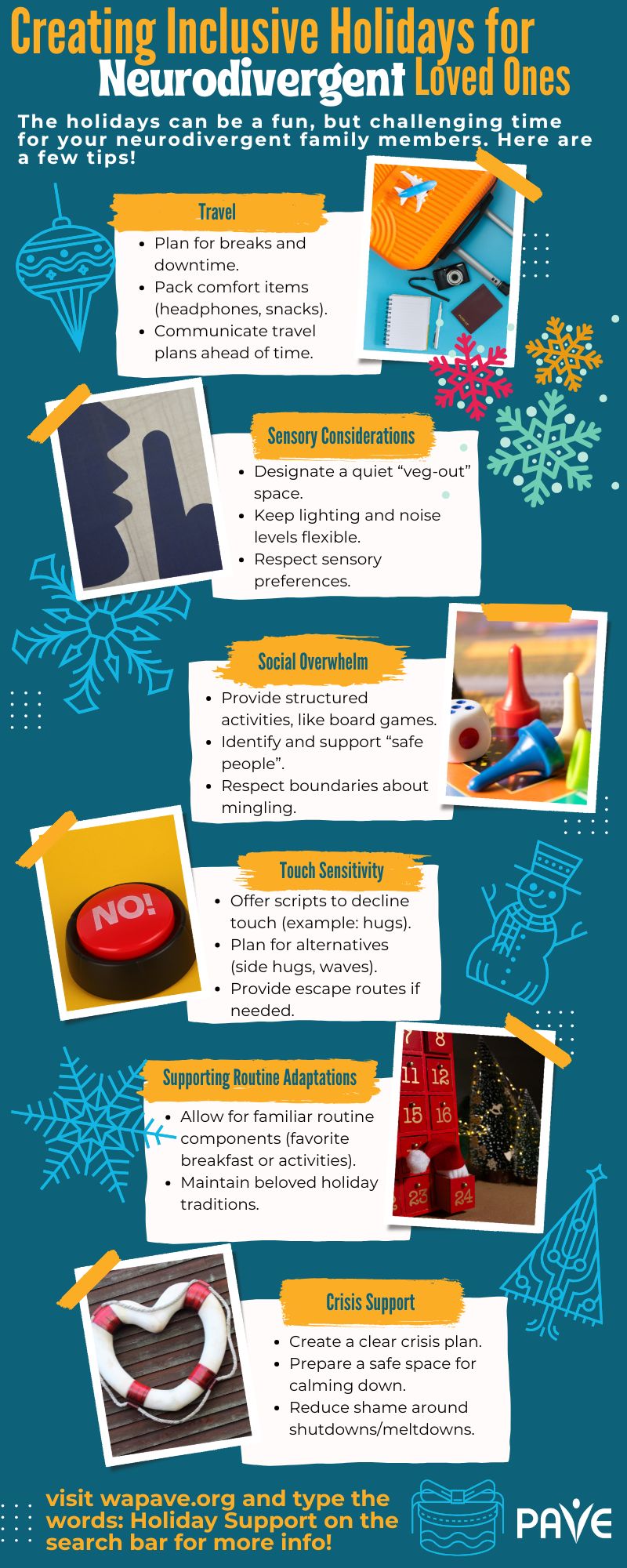The holidays are a fun and festive time that can also be overwhelming, especially for those whose brains operate differently from what is typical or expected. This difference is called neurodivergence and it encompasses a variety of brain-based disabilities.
A Brief Overview
- This is part of a four-part series on the topic of creating joyful and inclusive holidays for neurodivergent family members, which continues in
Meeting Neurodivergent Needs While Traveling ,
Sensory-Friendly Tips for Neurodivergent Loved Ones and
Comfortable Social Spaces for Neurodivergent Individuals During the Holidays. - The holidays can be overwhelming for neurodivergent individuals due to differences in how their brains operate.
- Proactive planning, clear communication, and providing a sense of agency can create an inclusive holiday season.
- Have a clear plan to support your loved one, including safe spaces and strategies to manage difficult moments.
- Understanding and supporting neurodivergent needs fosters a sense of belonging and acceptance, allowing everyone to enjoy the festive spirit.
Introduction
People often see travel, new food, music, and new social situations as some of the joys of holidays, but those who are neurodivergent can find these experiences overwhelming. This doesn’t mean they dislike the holidays; it just requires some preparation to make the season inclusive and enjoyable for your neurodivergent loved one.
To achieve an inclusive experience, your loved one should feel comfortable explaining their accessibility needs and asking for support when necessary, confident that those around them will respond with understanding and accommodate their needs. Overall, special attention should be focused on providing a sense of agency, which means giving individuals control over their own choices and actions. This includes planning for neurodivergent needs ahead of time rather than improvising and hoping for the best.
Travel
Traveling during the holidays can be particularly challenging for neurodivergent individuals due to changes in routine, unfamiliar environments, and sensory overload. To support your loved one, consider planning travel itineraries that include ample downtime, familiar items for comfort, and clear, detailed schedules to reduce anxiety. Additionally, choosing quieter travel times and less crowded destinations can help create a more manageable experience. Learn more about Meeting Neurodivergent Needs While Traveling in this article.
Sensory Considerations
Sensory sensitivities are common among neurodivergent individuals, making it essential to create a holiday environment that minimizes sensory overload. This can include using soft lighting, reducing loud noises, and providing sensory-friendly activities. Offering options like noise-canceling headphones, weighted blankets, or fidget toys can also help your loved one feel more at ease during holiday gatherings. Some neurodivergent individuals may find certain textures or physical contact uncomfortable or overwhelming. Preparing scripts, promoting awareness, and supporting touch boundaries can help your loved on engage to the best of their ability and personal comfort. For tips to support sensory needs, read Creating Joyful and Inclusive Holidays: Sensory-Friendly Tips for Neurodivergent Loved Ones and download hands-on tools in Giving the Gift of Sensory Regulation, Supporting a Happy Holiday Season for All.
Social Overwhelm
Social interactions can be overwhelming for neurodivergent individuals, especially during large holiday gatherings. Creating comfortable social spaces involves setting up quiet areas where your loved one can retreat if they need a break from the festivities. It’s also helpful to establish clear social expectations and provide opportunities for smaller, more intimate interactions. Encouraging open communication needs and boundaries can ensure everyone enjoys the holiday season. To explore more strategies for supporting your neurodivergent loved one’s social challenges, check out the article: Creating Joyful and Inclusive Holidays: Comfortable Social Spaces for Neurodivergent Individuals During the Holidays.
Routine adaptations
Navigating the holidays can be particularly challenging for neurodivergent individuals when an expected routine does not happen, often referred to as a “routine violation.” Some neurodivergent individuals enjoy doing the same things daily so they feel less distressed by the unexpected aspects of life and better able to cope. For example, eating the same food for breakfast, following the same morning routine, or going on the same walk may help them maintain a sense of stability and predictability. The holidays are full of routine violations, including both fun aspects (like getting presents, which can however cause difficulties around knowing an appropriate response) and more challenging ones (such as unexpected food and not being able to do the things that help you cope).
Planning for routine violations can help, as you can make adaptations that support the individual’s needs. It’s critical to have conversations about what aspects of the routine are the most essential and identify methods to support these aspects with the individual’s feedback. For example, allowing someone to bring fruit bars for their breakfast might be a very easy way to support their daily breakfast routine. Knowing ahead of time that a loved one has a personal routine at a set time every day allows for adaptations in planning, such as driving in separate vehicles or arranging for someone they trust to transport them. Adaptations can support routines, often with little to no impact on others’ holiday experience.
Maintaining holiday traditions that offer familiarity and comfort is also important. Certain traditions, such as White elephant gift exchanges or board games, may be beloved components of every holiday. Much anticipated activities and annual traditions can also positively support routine needs, despite them happening less frequently than daily routines.
Crisis Planning
Sometimes, even with everything going as planned, things can still go wrong. In such cases, a neurodivergent crisis can appear as an individual shutting down or melting down. While a shutdown may be a less disruptive internal experience requiring a quiet space to withdraw to and recover, it is still a crisis. In contrast, a meltdown presents a more challenging situation that may be more obvious and impact others. Having a clear crisis plan ensures everyone knows what to do to support your loved one, where the person can go, and how to keep them safe while avoiding embarrassment or guilt during the holidays. Being prepared can make all the difference in managing these difficult moments effectively and fostering acceptance.
Final Thoughts
While the holidays can be a joyous time filled with celebrations and new experiences, they can also be overwhelming for neurodivergent individuals. By understanding and accommodating their unique needs through proactive planning, clear communication, and providing a sense of agency, we can create an inclusive and enjoyable holiday season for everyone. This involves thoughtful travel arrangements, sensory-friendly environments, manageable social interactions, routine adaptations, and crisis planning, ensuring that the holidays are a time of comfort and joy for all. Empowering neurodivergent loved ones to manage their needs effectively fosters a sense of belonging and acceptance within the family. By fostering an environment of understanding and support, we can help our neurodivergent loved ones fully participate in the festive spirit of the season, creating a better and more inclusive experience for everyone.
Below is an infographic of the information above.
Download this infographic in PDF form

Learn More about Creating Joyful and Inclusive Holidays
This is part of a four-part series on the topic of creating joyful and inclusive holidays for neurodivergent family members. Meeting Neurodivergent Needs While Traveling provides tips and strategies to support neurodivergent individuals during travel to minimize stress. Learn Sensory-Friendly Tips for Neurodivergent Loved Ones to ensure they can enjoy the festivities and participate in making memories. Comfortable Social Spaces for Neurodivergent Individuals During the Holidays provides strategies for managing stress and overstimulation in social situations.

